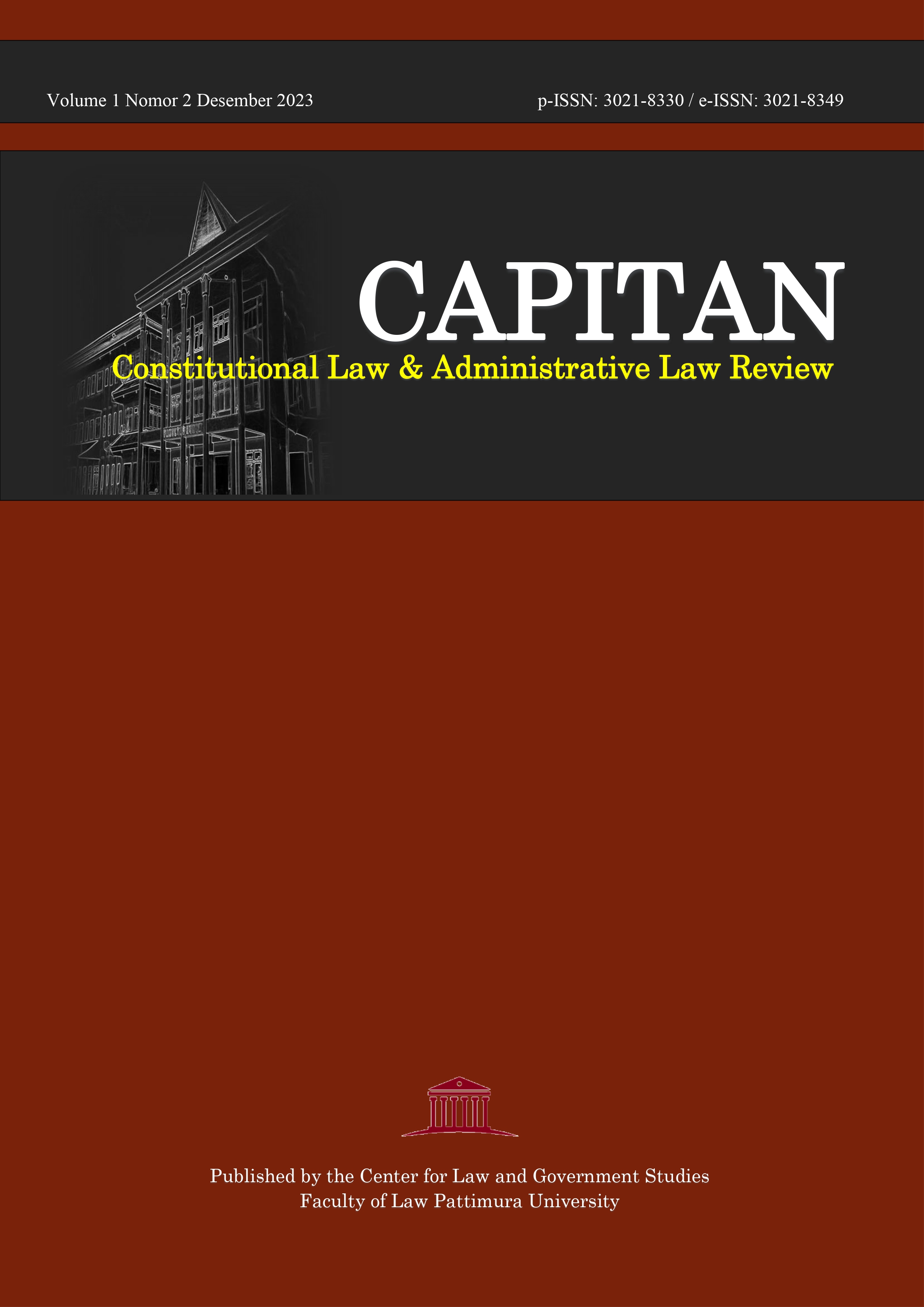Penegakan Hukum Administrasi Terhadap Pegawai Lapas Yang Terlibat Penyebaran Narkotika Di Dalam Lapas Kelas II A Ambon
Abstract
The aim of this research is to analyze and find out about the classification of abuse of authority by Correctional Institution officers who distribute narcotics and to find out disciplinary sanctions for Correctional Institution officers who distribute narcotics according to Government Regulation Number 94 of 2021 concerning Civil Servant Discipline. The research method used is the normative legal type. Based on the results obtained (1) The classification of abuse of authority carried out by correctional institution officers regarding the distribution of narcotics that occurs in prisons, in essence, is that a prison officer has an obligation that he must carry out in prison. (2) Disciplinary sanctions for Correctional Institution officers who distribute narcotics according to Government Regulation Number 94 of 2021 concerning Civil Servant discipline are in the form of lighter disciplinary and administrative sanctions compared to Government Regulation Number 53 of 2010, namely Respectful Dismissal Not at Your Own Request. Where there is still a gap in Government Regulation Number 94 of 2021 concerning Civil Servant discipline for abusers who have civil servant status to receive pension benefits if they meet the criteria.
Downloads
References
Jurnal
Ferdian Rinaldi, (2017), Pertanggungjawaban Pidana Petugas Lapas yang Terlibat Peredaran Narkotika di Lembaga Pemasyarakatan. Jurnal Hukum Respublica, Vol. 17 No. 1 Tahun 2017.
Hanindya Seno Saskara, (2020), Pemberatan Pidana bagi Petugas Lembaga Pemasyarakatan yang Terlibat Peredaran Narkotika Di Lingkungan Lembaga Pemasyarakatan. Jurist Diction Vol. 3 (5).
Muvariz, (2019), Analisis Aspek Keadilan Dari Pemberhentian Tidak Dengan Hormat Sebagai Pegawai Negeri Sipil Di Indonesia, Jurnal Legislasi Indonesia Vol 16 No.2
Pasek Saputra dkk, (2021), Sanksi Hukum Bagi Petugas Lembaga Pemasyarakatan Yang Terlibat Peredaran Narkotika Di Lingkungan Lembaga Pemasyarakatan. Jurnal Interpretasi Hukum Vol.2, No.2–Agustus 2021
Suhayati, Monika, (2015), Penegakan Hukum Peredaran Narkoba Di Lapas Dan Rutan. Jurnal Info Singkat Hukum. Vol. 7(8).
Buku
Bambang Sunggono. Metode Penelitian Hukum. Jakarta: Rajawali Pers, 2010.
Fakultas Hukum Universitas Muhammadiyah Sumatera Utara. Pedoman Penulisan Skripsi. Medan: Fakultas Hukum, 2014.
J. Moleong, Lexy. Metodologi Penelitian Kualitatif. Bandung: PT Remaja Rosdakarya, 2010.
Kementerian Hukum Dan Hak Asasi Manusia. Kode Etik. Pegawai Pemasyarakatan. Majelis Kehormatan.
Masri Singaribun Sofyan Effendi, Metode Penelitian Survey (Jakarta: LP3ES, 1987).
Mustofa. Metodologi Penelitian Kriminologi. Jakarta: Prenada Media, 2013.
Soerjono Soekanto. Pokok-Pokok Sosiologi Hukum. Jakarta: RajaGrafindo, 2013.
Soerjono Soekanto dan Sri Mamudji, Penelitian Hukum Normatif. Jakarta: Raja Grafindo, 2011.
Soerjono Soekanto & Sri Mamudji, Penelitian Hukum Normatif (Suatu Tinjauan Singkat) Jakarta: Rajawali Pers, 2001.
Peter Mahmud Marzuki, Penelitian Hukum, Kencana Prenada, Jakarta, 2010.
Amirudin dan H. Zainal Asikin, Pengantar Metode Penelitian Hukum, PT. Raja Grafindo Persada, Jakarta, 2006.
Burhan Ashofa, Metode Penelitian Hukum, Rineka Cipta, Jakarta, 2007.
Peter Mahmud Marzuki, Penelitian Hukum, Prenanda Media Group, Jakarta, 2005.
Peter Mahmud Marzuki, Penelitian Hukum (edisi Revisi), Prenanda Media Group, Jakarta, 2012.
J. Moleong, Lexy, Metodologi Penelitian Kualitatif, Bandung: Remaja Rosdakarya, 2010.
Wursanto IG. 2003. Manajemen Kepegawaian 2. Jakarta: Kanisius
Lain-Lain
Badan Narkotika Nasional Republik Indonesia, (2012), Jurnal Data Pencegahan dan Pemberantasan Penyalahgunaan dan Peredaran Gelap Narkoba (P4GN) Tahun 2011 Edisi Tahun 2012.
Copyright (c) 2023 Mayakarin Fiadolla Sattu, Hendrik Salmon, Heillen Martha Yosephine Tita (Author)

This work is licensed under a Creative Commons Attribution-NonCommercial 4.0 International License.
Authors who publish their manuscripts in this Journal agree to the following conditions:
- The copyright in each article belongs to the author, as well as the right to patent.
- Authors are able to enter into separate, additional contractual arrangements for the non-exclusive distribution of the journal's published version of the work (e.g., post it to an institutional repository or publish it in a book), with an acknowledgment of its initial publication in this journal.
- Authors are permitted and encouraged to post their work online (e.g., in institutional repositories or on their website) prior to and during the submission process, as it can lead to productive exchanges, as well as earlier and greater citation of published work.
- Authors have the right to self-archiving of the article (Author Self-Archiving Policy)













